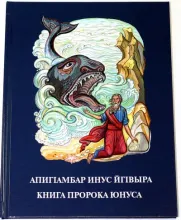news-060919
The Institute for Bible Translation is continuing its translation work into the Even language of eastern Siberia in partnership with SIL International. 2018 saw the publication of Stories from the Holy Scripture, and now IBT has published Gospel Parables. The book contains four parables from the Gospel of Luke: the Good Samaritan, the Wedding Feast, the Prodigal Son, and the Pharisee and the Tax Collector.
The Even translation was produced by V. S. Elrika and R. P. Kuzmina, professional linguists and faculty members of the Altaic Languages Department of the Institute of the Peoples of the North at Herzen State Pedagogical University.
news-050719
IBT has recently published the Old Testament book of the prophet Jonah in the Abaza language. This is the first OT book ever published in Abaza. Previously, IBT had published an excerpt from the Gospel of Luke, ch. 2, in 2000.
news-170519
IBT has published the Old Testament book of the prophet Jonah in the Yakut (Sakha) language of the Sakha Republic (Yakutia). The text of the story is presented in three languages – Yakut, Russian, and English – in order to meet the needs of younger generations of Sakha speakers. IBT hopes that this trilingual edition will help Sakha readers to understand the biblical text better and will also aid them in language study.
news-100519
IBT has published a Kabardian-language version of the illustrated Gospel Parables. This is the tenth language to get this book. The series was begun in 2007 with the Agul edition, followed in 2015-2018 by Bezhta, Dargi, Dungan, Kumyk, Nogai, Rutul, Tatar and Tsakhur.
newsletter-180419

A Russian translation of Analyzing Discourse: A Manual of Basic Concepts by Robert A. Dooley and Stephen H. Levinsohn, linguists working with SIL International, is the latest scholarly edition published by IBT. This linguistic handbook was first published in English by SIL in 2000. The present edition was translated and contextualized by Russian linguists with the contemporary Russian speaker in mind.
The purpose of this book is to acquaint future field linguists with the basic concepts of discourse analysis, so that they can use them in analyzing linguistic material gathered in various languages. Having a sound grasp of textual discourse concepts and other principles of communication is necessary for studying a foreign language, doing lexical, semantic and morphosyntactic analysis, or carrying out practical tasks such as teaching, expressive writing or translating.
news-190319
IBT’s new Lak edition appears under the title Injil, the Arabic equivalent of the Greek term εὐαγγέλιον, which means "gospel, good news." It includes a revision of the Gospel of Luke and the first-ever publication of the Acts of the Apostles. The first Lak translation of Luke was published by IBT in 2003, and then reprinted in 2012. The translation is accompanied by footnotes with relevant cultural and historical information, as well as a glossary of key biblical terms and difficult Lak words, maps of the ancient Mediterranean world, and other supplemental materials.
news-140219
IBT has published another two Dungan-language editions from the series “The Lives of the Prophets”, this time on the stories of Abraham and Joseph from the book of Genesis. The first book in this series was the Noah story, published in 2016. The Dungan translations of the Abraham and Joseph stories are accompanied by a parallel Russian text, as well as by beautiful illustrations by Dungan artist Khalida Shimova and an audio recording on CD.
newsletter-240219
The Institute for Bible Translation is pleased to announce a new edition of The Bible and the Koran: Parallel Passages, a scholarly work that presents the reader with passages from the Jewish and Christian Scriptures that find their parallels in the Koran, the sacred text of Islam. Whereas IBT’s earlier editions of this book came out in Russian (in 2005, 2012, 2014 and 2018), this time the book has been published in the Tatar language.
news-301118
The Institute for Bible Translation has published the New Testament in the Lezgi language with an official stamp of approval from the Institute of Linguistics at the Russian Academy of Sciences. This marks the completion of many years of work by talented Lezgi writers and poets, theologians, and scholars of the Lezgi language, including Dr. B. B. Talibov, Dr. M. E. Alekseyev, Dr. N. A. Abdulgamidov, Dr. Marianne Beerle-Moore, and others.
news-241018
Following quickly on the heels of last year’s presentation of the Kabardian translation of Proverbs in Nalchik, IBT has published yet another Scripture portion in Kabardian, the books of Daniel and Ruth in a single edition.
The Kabardian language, also known as Circassian or Cherkess, is spoken by approximately 516,000 speakers in the Russian Federation. It is one of the official languages of the Kabardino-Balkaria and Karachaevo-Cherkessia areas of southern Russia. Previous Kabardian Scripture editions include the New Testament, a revised version of Luke, Ruth, Jonah, and Proverbs. The current publication is a reprint edition of Ruth together with the first-ever translation of Daniel.









